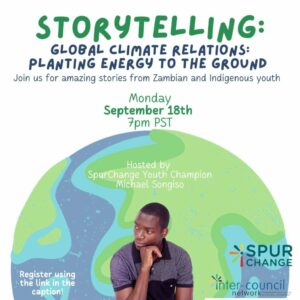This post was written by Michael Songiso in reflection on his activities as part of Spur Change's Youth Champions Program.
Introduction
 The need for an inclusive climate action through a participatory gendered approach has been drawing great attention in policy making, key to this inclusion is bringing in indigenous perspectives and experiences, even the Intergovernmental Panel on Climate Change (IPCC) report acknowledges the need to proactively include indigenous knowledge in climate action, read the full report on IPCC Sixth Assessment Report. Throughout the Spur Change Youth Championship program, I learnt that the SDGs and climate action is mostly euro-centric and lacks indigenous perspectives, it is for this reason that I decided to host two virtual storytelling events that focus on global solidarity in the context of climate indigenous perspectives and gender equality as my public engagement activity. The virtual storytelling events which brought together more than 80 virtual participants was characterized by amazing indigenous earth songs, poems, environmental knowledge and sense of community. The storytellers who were indigenous youths from Zambia and Canada further shared their lived experiences on the climate reality.
The need for an inclusive climate action through a participatory gendered approach has been drawing great attention in policy making, key to this inclusion is bringing in indigenous perspectives and experiences, even the Intergovernmental Panel on Climate Change (IPCC) report acknowledges the need to proactively include indigenous knowledge in climate action, read the full report on IPCC Sixth Assessment Report. Throughout the Spur Change Youth Championship program, I learnt that the SDGs and climate action is mostly euro-centric and lacks indigenous perspectives, it is for this reason that I decided to host two virtual storytelling events that focus on global solidarity in the context of climate indigenous perspectives and gender equality as my public engagement activity. The virtual storytelling events which brought together more than 80 virtual participants was characterized by amazing indigenous earth songs, poems, environmental knowledge and sense of community. The storytellers who were indigenous youths from Zambia and Canada further shared their lived experiences on the climate reality.
The two virtual storytelling events were hosted in June and September of 2023 and were titled Global Citizenship and Global Climate Relations respectively.
Storytelling Highlights

Bees are Family: One Zambian youth storyteller shared about her nature friendly culture and tradition. The storyteller who happens to have both Luvale and Kaonde heritage shared how she is from the bee clan on her father’s side and the lion clan on the mother’s side of the family. In her lived experience, the storyteller shared how her father used to make local beehives and that it is not allowed kill bees they are family according to their tradition, she further narrated how she enjoyed honey harvesting with her father without getting stung by the bee, to signify her clan is from the bee clan, her house main door has portraits of trees and bee hives on them, below is a picture of the door with trees and some traditional beehives.
Nunavut my Territory: The other storyteller that blew our minds was Katie May, a Canadian indigenous youth who shared a presentation about her territory of Nunavut, you can find her presentation here. This storyteller’s presentation showed how climate change realities affects the people of Nunavut. Besides the epic photos of Nunavut’s peoples, vegetation, plants, animals and aquatic life, the storytellers videos in the presentation was soul-soothing.
Impact and Takeaways
- Climate action with an inclusive gender sensitive and indigenous approach is key to fighting climate change.
- Indigenous knowledge acknowledges the importance of nature and living in harmony with land as seen in the ‘Bees are Family’ story.
- There is a wealthy of indigenous knowledge that should be explored and prioritized in climate action and policy, using virtual storytelling event can be the start point.

